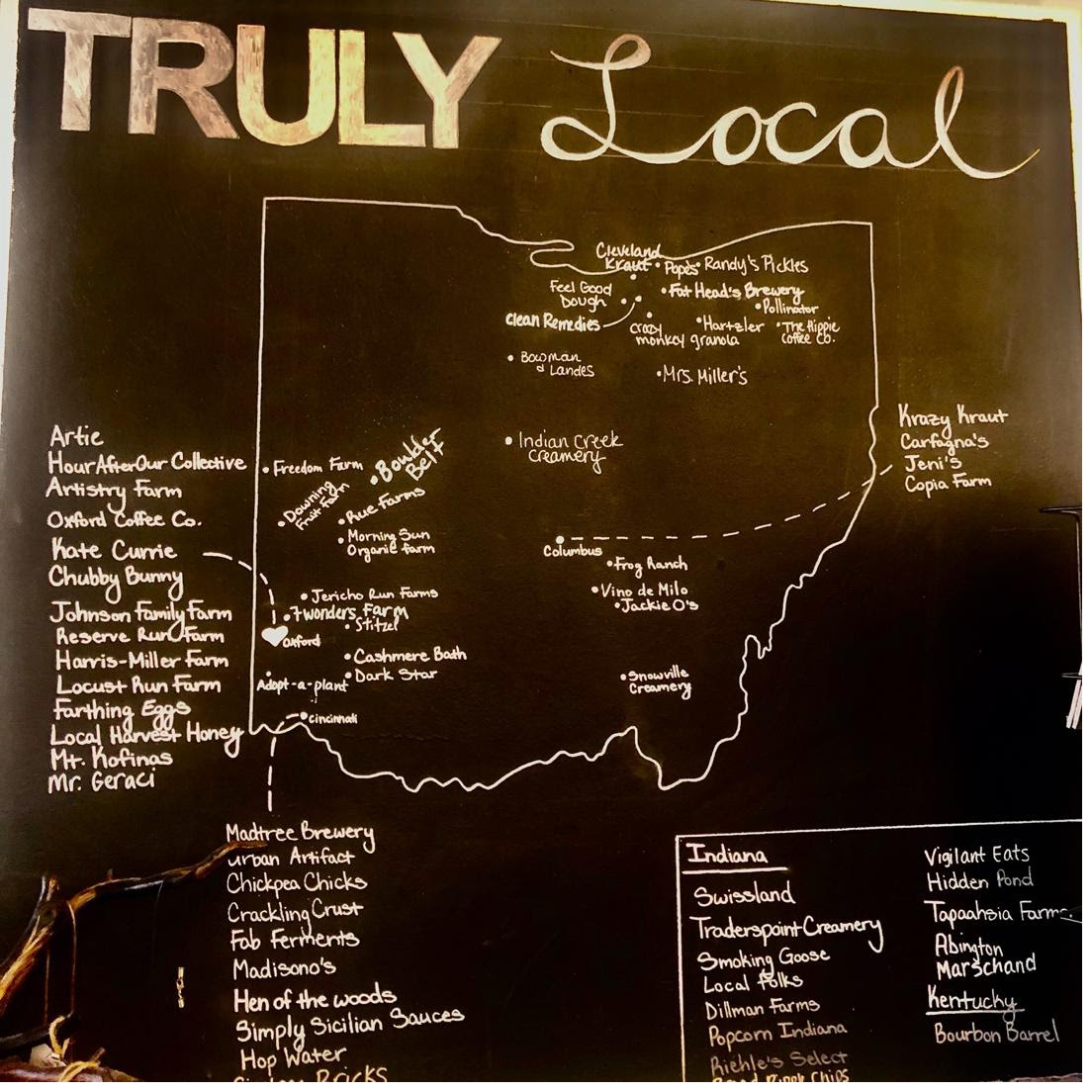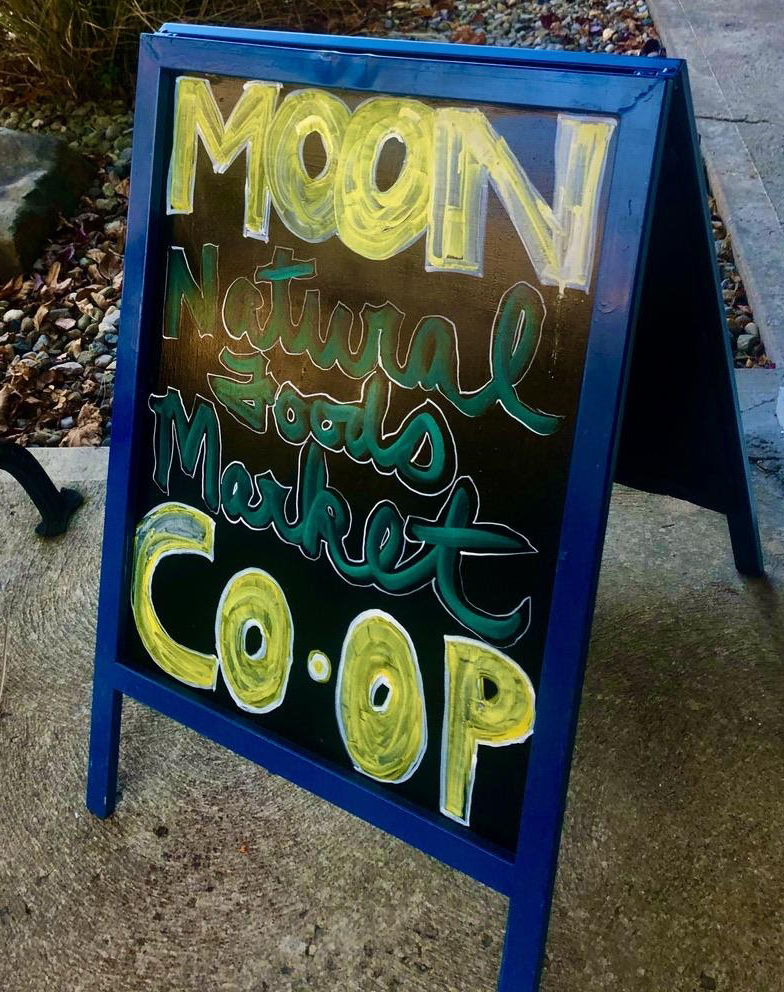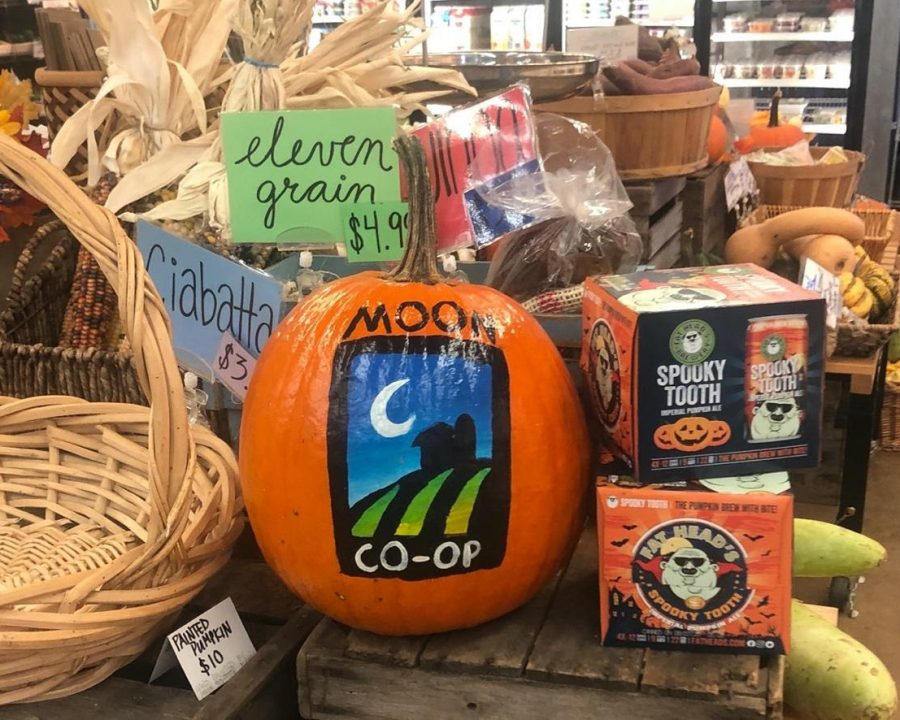MOON Co-op: One of Oxford’s best-kept secrets
MOON’s colorful produce section invites customers in as they walk through the door.
December 4, 2020
When all “non-essential” businesses were ordered to temporarily close last March to combat the COVID-19 pandemic, it was devastating to many Oxford retailers. Fortunately for MOON Co-op, it was essential.
MOON Co-op is a small natural foods market hidden in the Tollgate Shopping Mall. Groceries and farmers markets were among the businesses exempted from the shutdown order. MOON (Miami Oxford Organic Network) Co-op holds its own as a community staple that’s become more than just a place to buy food.
When customers walk into MOON Co-op, they are instantly greeted not only by the staff, but by an inviting atmosphere created by the colorful produce section and deli; hand-written labels and signs; and music, usually of the classic rock variety. It’s a place where people can come and they feel like they’re with friends, according to Tom Swing, MOON Co-op’s store manager.
“Everybody gets greeted, everybody gets thanked,” said Swing. “We want to take it back to a kinder, gentler time in American business, before all the hustle and bustle.”
MOON Co-op embraces this ideal through its “Mom-and-Pop” store model. Working with a zero-dollar advertising budget, in contrast to Kroger and Walmart’s multi-million-dollar ones, MOON relies on word-of-mouth to build its base.
“We’re still Oxford’s best-kept secret,” said Swing. “The old way is not always bad. Progress is great. But don’t lose the basics. Don’t lose customer service, friendliness, treating people fairly, treating people the way you’d want to be treated.”
MOON makes it possible for local farmers, merchants, individuals and even artisans to sell their products.
Local farmer, Craig Harkrider of Stoney Hedgerow Farm, 10 miles north of Oxford, appreciates MOON Co-op’s mission and intention to provide fresh, local food to consumers.

“MOON definitely has a place for the community as a good source of healthy food that is sometimes unique, sometimes sourced better, differently, more holistically, organically and such,” said Harkrider.
Harkrider, whose farm grows peppers, garlic, butternut squash and tomatoes, mainly sells his produce at Oxford’s Farmers Market on Tuesdays and Saturdays. But he also supplies MOON Co-op and donates his extra produce to MOON’s café.
Amid the pandemic crisis, MOON Co-op has remained relatively unscathed, along with farms like Harkrider’s. The only challenges, according to Swing, are those mandated by the state. The store adheres to restricted hours and requires customers to wear masks and social distance.
Despite COVID-19, MOON Co-op has had a great year financially, and Swing reports a rise in its regular customers.
“Some people that had hardly ever shopped here before started shopping here, and now they’ve become regular customers,” said Swing. “We had people during the pandemic come in that were thankful we were here because they were afraid to go anywhere else. They know we do things right.”
Harkrider has also enjoyed the loyalty of his customers – especially at the Oxford Farmers Market, which was likewise deemed an essential business. His sales there have quadrupled over the last four years, he said.
“We had people who showed up, and every week they were there, and they were very, very supportive. It really is encouraging. It really helps you feel like what you’re doing means something to someone,” said Harkrider.
Harkrider also said his experience is not unique with farms across the country likewise reporting a boom in demand.
A business that fosters a sense of community
In a town dominated by small local businesses, MOON maintains its uniqueness in not only its product but also its ownership structure.

What started out as the Oxford community ordering from United Natural Foods and housing the deliveries in neighborhood garages, turned into the brick and mortar building it is now. MOON Co-op is a cooperative, meaning it is owned by its members. But what really sets MOON Co-op apart is the community it fosters.
MOON Co-op is a place that values its customers’ needs and responds to them, Swing said.
“Most of the items on our shelves are items that customers have asked for,” he said. “We’re here for the community.”
Nani Ball, a MOON Co-op and Ohio Ecological Food and Farm Association (OEFFA) member, is among the customers more comfortable shopping at MOON Co-op.
“Right now, with COVID going on, I’m comfortable going into that small store where everybody is conscientiously wearing a mask and you’re not too close to each other, and you can choose your time so it’s not crowded,” said Ball. “What they offer is often what I’m looking for.”
Although MOON was created by and for Oxford residents, it also offers Miami students an opportunity to buy fresh, local food or grab n’ go meals.
“The people at MOON Co-op make the shopping experience more valuable and catered to the specific customer,” said Caroline Evans, a Miami junior, majoring in strategic communication. “When I go to MOON Co-op, I feel like they care about my needs.”
Many of the same people who shop at MOON Co-op often frequent Oxford’s Farmers Market each week, where the sense of community is also on display.
“You get to talk about, not just, you know, peppers and garlic, but you talk about life,” said Harkrider. “These are very special relationships.”
Pandemic crisis continues for many local businesses
While MOON Co-op is faring well during this pandemic, other local businesses are struggling.
Back in April, Oxford tried buying and reselling to potential shoppers $200,000 worth of gift cards from local businesses, hoping to spur local shopping. The plan was scrapped in October after few of the cards sold. The city then converted the funds it had used for the cards to direct grants to qualifying businesses.
“Even now, their income is down,” said Jessica Greene, Oxford’s assistant city manager. “It’s really hurting our local business economy.”
With Ohio Gov. Mike DeWine’s warnings about possible resumption of additional business closures and a statewide 10 p.m. curfew now in effect, the situation is ever more worrisome for local business owners.
“We’re all on the edge of our seats, watching and waiting,” said Greene. “We will begin immediately racking our brains about how to support our local businesses.”
The holiday season complicates matters more, with most of the student population gone again until the end of January.
“Our economy is really student-centered,” Greene said. “When the students are gone, our businesses are struggling already. I hate to use the word dire situation, but it kind of is.”














